Juliette Binoche: ‘It’s difficult to spend your entire life with the same person’
At 58, the French actress will receive the Donostia Award from the San Sebastián International Film Festival in Spain. In an unfiltered interview, she spoke with EL PAÍS about her life and latest film
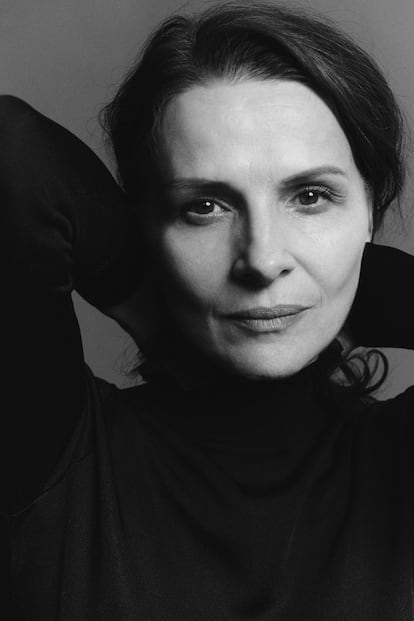
The appointment is a Saturday afternoon by the end of August. Juliette Binoche sits on a sidewalk café in her neighborhood, in the southwest of Paris – residential, with a reputation for being a little boring, richer than it seems. She arrives alone, with no entourage, dressed casually. Nothing indicates that we are in front of a movie star, except for a natural authority that appears when she dislikes a question.
Binoche has come to talk about Both Sides of the Blade, her third collaboration with director Claire Denis. In the film, she plays a woman who hesitates between a satisfactory but somewhat routine relationship and a former lover who reminds her what passion was. For the role, she recalled the story of a married friend who once confessed that he had feelings for her.
“He told me he couldn’t put his heart in the fridge. The same thing happens to my character,” she said.
Both Sides of the Blade will be released in theaters on September 30, after screening at the San Sebastián International Film Festival, where the 58-year-old actress will receive the Donostia Award in recognition of a career in which she has nothing left to prove. Binoche is the only actress who has an Oscar, a César, a Bafta and the acting awards given out by three major film festivals: Cannes, Venice and Berlin.
Question. Do you understand your character in the film?
Answer. To play a role, it’s not enough to understand it. You must integrate it into yourself, into your body.
Q. I ask because it was hard for me to understand.
A. What did you not understand?
Q. I don’t know if she acts in bad faith, if she’s a liar, a manipulator…
A. I don’t see it that way. She is a character who wants to be free, as I have always wanted to be. She wants to experience love and desire in order to understand who she is. Because of our upbringing, we don’t always allow ourselves to give in to temptation, because it hurts others or because it scares us. But the situation described in the film exists in any couple, if we’re honest. In the original script, there were scenes that better explained my character’s reasoning, but they were cut to focus more on the male character…
Q. Did this make you upset?
A. Yes, because I think the viewer understands my character less… Claire Denis did not want to delve into her situation. I don’t know why, ask her...
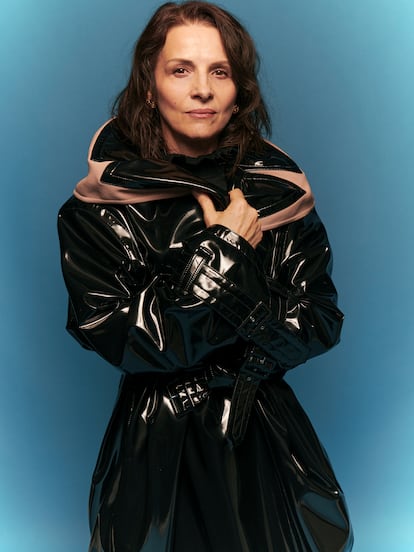
Q. Your first film with Claire Denis, Let the Sunshine In, was a romantic comedy. This one, on the other hand, is almost a horror story, in which love destroys lives.
A. It may not be an encouraging vision, but I find it very sincere when it comes to showing the complexity and contradictions of a relationship. It does not seek to reflect perfection, but reality. You don’t have to aspire to perfect love, because we aren’t perfect either.
Q. Both Sides of the Blade speaks about the possibility of starting over from scratch at any age. Do you agree?
A. Yes. We move forward in life through separations. As children, we put aside our first toys and then we separate ourselves from our friends, from our families, from our partners. Life is a continual separation. Without separation, there is no evolution.
Q. Don’t couples who stay together for life evolve?
A. It seems admirable to me, as long as it’s not out of mere indifference or economic reasons. But when you’re honest with yourself, it’s very difficult to stay with the same person all your life. Great tolerance and intelligence are required not to separate. For example, to accept that a woman’s success should not be interpreted as an attack against a man...
Q. Has that happened to you?
A. Yes, I’ve seen that jealousy in my partners, who have reproached me for working too hard and doing well. It’s a classic criticism… but nobody criticized Renoir – who painted every day until his death – for working too hard.
Q. Traditional gender roles are hard to shed.
A. Yes, and I believe that the traditional, in art, does not exist. “Normal” should not exist. We artists must go towards the new, do things that have not been done.
Q. The film contrasts reasonable love with brazen love – that famous amour fou that the French know so much about. Which one do you believe in?
A. I have lived crazy loves. Reasonable love? I don’t know what that is. For me, no love is reasonable. It’s something that is beyond us. The problem is that day-to-day habits kill it over a slow Both Sides of the Blade…
Q. Is family life not for you?
A. On the contrary, I am very much into family rituals, meals at home. We almost always meet up at my house.
Q. Do you like them because you didn’t have them as a child?
A. I had a childhood shaken by the separation of my parents, by economic problems, by historical events. I am the daughter of the sixties generation, of the events of 1968. My parents were very involved politically and that marked my youth.
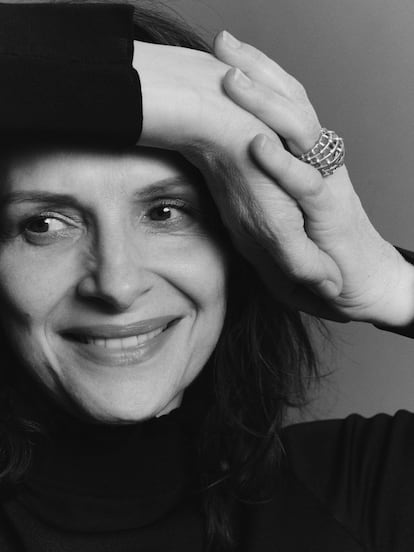
Q. In what sense?
A. They put me in a boarding school because they were not interested in having that family life, until my mother came to get me when I was seven years old. That abandonment has been a bottomless pit to rebuild my life from. Instead of spending the day crying or feeling like a victim, it has helped me understand human nature and, from there, give to others. I became an actress because of those events. In a more serene family context, I might have dedicated myself to something else.
Q. Is being an artist doing something constructive with those wounds?
A. They are part of me, but I don’t think about them every day. Above all, I am guided by the joy of living – and it is not a superficial joy, because it is linked to something very deep.
Q. Does that explain your tendency to shoot dramas?
A. I like comedies when they are linked to an inner drama. The ones that aren’t seem boring, silly, or fake to me. Like almost everyone, I have felt the need to connect with the essential, with the existential. I want to go where we don’t usually want to go. Because, if we don’t go deep, if we don’t touch bone, we can’t transform ourselves.
Q. You usually portray women who undergo transformations.
A. If I don’t see a transformation in the script, I’m usually not interested. I insist: as human beings, our mission in life is to transform ourselves. Understand new things, put aside the useless. From these transformations, we come out lighter and more authentic. There is nothing better than change, although that requires a certain courage.
Q. Does spirituality matter to you?
A. At three or four years old, I already had a spiritual life. In the boarding school, there was a nativity scene that seemed magical and mysterious to me. Ultimately, being an actress is about believing. If one does not believe, one cannot transform.
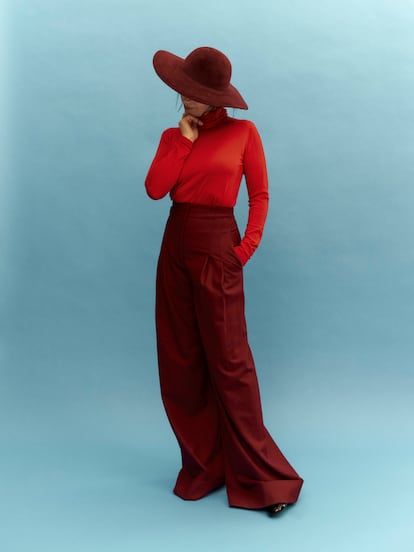
Q. During the 2020 lockdown, you published an editorial in Le Monde advocating a change to the socio-economic model entitled “No to a return to normal.” It was signed by 200 cultural figures, including Penélope Cruz, Madonna and yourself. Were you naive to believe that change was possible?
A. I don’t think the editorial changed everything, but it raised awareness. In my neighborhood, there used to be an organic supermarket – in recent years, they have opened four or five more. But it’s a very slow process, because there is no law that taxes large fortunes or polluting industries.
Q. When French President Emmanuel Macron says this is “the end of abundance,” how do you react to his words?
A. The revolution will take place within each person, on an individual scale, in everyday life. Politicians will do nothing, because what they want is to retain power and stop change. At the moment, I don’t see environmental leaders capable of leading this movement, but I do detect a change among the people. And that makes me feel a little more optimistic.
Q. Given your advocacy for the environment, but also your support for the Yellow Vest Movement, should we place you on the extreme left?
A. I am not on the extreme left, but you have to understand where the anger of those who protest – of those who are unprotected – comes from. If we ignore that anger and continue to crush them, I don’t see how we find solutions.
Q. Would you be interested in going into politics?
A. I’m only interested in art. When I raised my voice about ecology, I realized that my words sounded very annoying. My place is in film, where I can express myself.
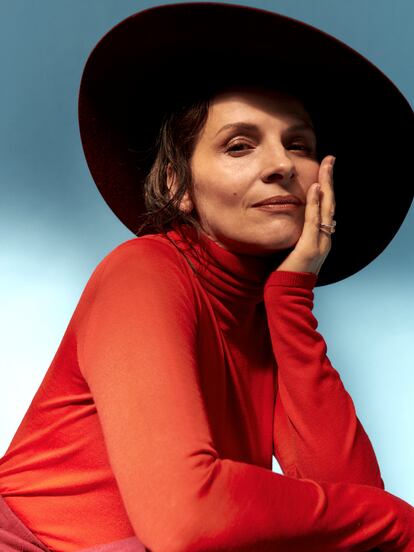
Q. When you opposed the mandatory vaccinations decreed by Macron, you were accused of being a conspiracy theorist.
A. I don’t know why people say that. Having seen what we have seen, we don’t have the right to ask questions, or to question the decisions of the government? This seems nonsensical to me, especially in a country that supposedly stands for freedom, equality and fraternity.
Q. What worries you about vaccinations?
A. I am not against vaccines, some are very useful. But I didn’t understand why they forced nurses to inject them if they wanted to continue practicing, for example.
Q. After your Oscar for The English Patient, you rejected everything in Hollywood and returned to France.
A. I wanted to go back to shoot with André Téchiné, the first person who gave me an opportunity when I was 21. And it’s not as if they offered me so many things in Hollywood...
Q. You said no to Steven Spielberg three times…
A. He offered me Jurassic Park, but I had already committed to shooting Blue with Krzysztof Kieslowski. My word is my bond. On the other hand, the roles Spielberg proposed didn’t seem exciting to me. In Indiana Jones and the Last Crusade, I would have been a minor character… and in Schindler’s List, he wanted me to be a girl who was beaten and killed. I was pregnant and I didn’t feel like it.
Q. Is American cinema too masculine?
A. That goes without saying…
Q. Has the #MeToo movement changed anything?
A. Yes, there have been important changes. In the series that I am shooting for Apple – where I play Coco Chanel – and in my next film, they have offered me the same salary as my male colleagues without me having to demand it. The salary question is a war that I have not waged, because money has never been what has moved me. When I was interviewed during the Weinstein scandal, I didn’t talk about that, I have to admit. But women who did do that were completely right.
Q. That doesn’t mean that Hollywood has gone feminist, does it?
A. Clearly not. It would be enough to reject films that convey certain messages, although I understand women who don’t, because we all have to work. But solving the problem is as easy as saying no to movies that uses an actress as a sidekick...
Q. In France, the situation is different. For five decades, the biggest movie stars have been women: you, Catherine Deneuve, Isabelle Huppert, Sophie Marceau, Marion Cotillard...
A. Yes, it is a particular case and luck. That’s why, when they ask me if, as a woman, I feel any frustration in the film world, I answer that it is quite the opposite. On a shoot, I am always on the bow of the ship, deciding which way to go.
Q. To what extent has your relationship with Leos Carax – with whom you made two films when you were getting started – been important in your career?
A. In the first one – Bad Blood – we didn’t know each other. I wanted him to like me and I did everything for him. In the second, The Lovers on the Bridge, it was very different: we lived together and he wrote the script while I painted alongside him. I wanted to be less idealized, closer to reality. And there were more confrontations, because of the problems in our relationship and because it was a very long and difficult shoot.
Q. Something else changed between those two films: you went from being an actress to becoming a star.
A. What really happened is that I nearly died during that shoot. I almost drowned while filming a scene. That’s when I realized that my life was more important than any movie, no matter how good it was. I learned to say no. Being a young actress, I couldn’t, or didn’t know how.
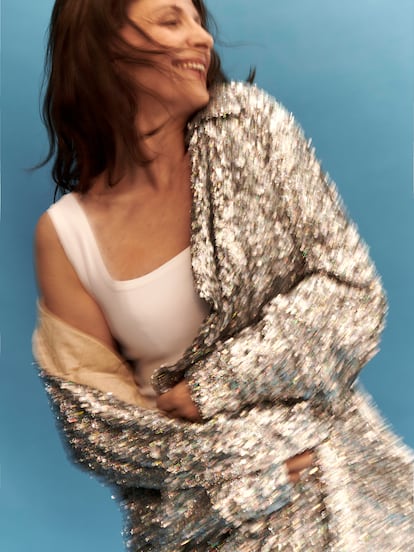
Q. You’ve just shot two series, one for HBO and the other for Apple. What is that process like?
A. The series are machineries where the directors change from one episode to the next. Unlike with movies, I don’t know who makes the decisions. Sometimes I have to fight for a little more privacy and ask the assistant director to shout less or the cinematographer to stop chewing his gum noisily… there are rules that must be respected everywhere.
Q. The power of streaming platforms endangers the survival of movie theaters. Are you concerned?
A. Of course.
Q. So isn’t it contradictory to work for them?
A. The world is changing. Streaming is what works now… that’s what the producers and the rich want to invest in. We can’t be in the resistance endlessly until we’re left alone on a desert island. We have to accept these changes and participate in them by making quality projects. I approach each role with this mindset: that the work should move the people who see it.
Tu suscripción se está usando en otro dispositivo
¿Quieres añadir otro usuario a tu suscripción?
Si continúas leyendo en este dispositivo, no se podrá leer en el otro.
FlechaTu suscripción se está usando en otro dispositivo y solo puedes acceder a EL PAÍS desde un dispositivo a la vez.
Si quieres compartir tu cuenta, cambia tu suscripción a la modalidad Premium, así podrás añadir otro usuario. Cada uno accederá con su propia cuenta de email, lo que os permitirá personalizar vuestra experiencia en EL PAÍS.
¿Tienes una suscripción de empresa? Accede aquí para contratar más cuentas.
En el caso de no saber quién está usando tu cuenta, te recomendamos cambiar tu contraseña aquí.
Si decides continuar compartiendo tu cuenta, este mensaje se mostrará en tu dispositivo y en el de la otra persona que está usando tu cuenta de forma indefinida, afectando a tu experiencia de lectura. Puedes consultar aquí los términos y condiciones de la suscripción digital.









































